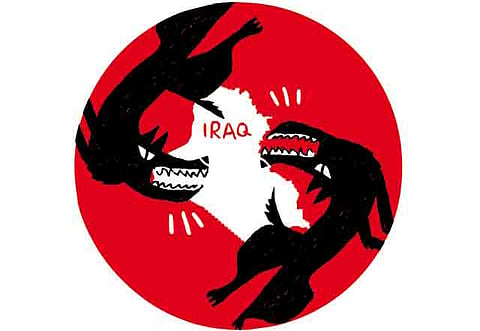Foreign interference doesn't help Iraq
Obama would do well to follow the lead of the Ayatollah to whom he recently appealed for help

When all is said and done in Iraq, and a lot is being said and done these days, the United States will keep an estimated 50,000 troops in Mesopotamia for decades to come. "Operation Iraqi Freedom" will officially become "Operation New Dawn" on September 1, 2010 — even if "Lunacy 101" replaced "Shock and Awe". What will it take to place Baghdad on the road to functioning governance?
A beaming US Commander in Iraq, General Ray Odierno, freshly reiterated that US forces will stay as long as the Iraqi government wishes them to, ostensibly to deny foreign powers — read Iran, Turkey and Saudi Arabia — from meddling in the country's internal affairs. Still, it was unclear what that actually meant, especially after President Barack Obama prognosticated that the US has not "seen the end of American sacrifice in Iraq". While few should expect a White House banner on August 31 to claim "Mission Accomplished", combat missions will then fall under a new soubriquet: training Iraqis to fight on their own.
Odierno offered a clear explanation when he noted that Washington intended to keep a "significant civilian presence" — in addition to the 50,000 troops — to ensure that Baghdad could function. He was optimistic that the nascent Iraqi army would handle challenges despite an undeniable hike in violence. What the commander did not acknowledge, however, was whether American forces would be dragged into the Iraqi political maze by siding with one faction against another if and when a civil war emerged. Likewise, it was unclear whether a potential military coup in Baghdad, where such occurrences were common before Saddam Hussain dominated the scene, would force Odierno's successor, General Lloyd J. Austin III, to opt for a military solution over a civilian option.
Consequently, and five months into one of the most enigmatic parliamentary elections, officials in Baghdad have yet to agree on the identity of the next prime minister, or on a new government that will address long-delayed socio-economic as well as security needs.
On the Baghdad home front, outgoing Iraqi President Jalal Talabani sounded an alarm about looming perils and risks, especially since no political solutions existed. For his part, the Iraq Kurdistan Regional President Masoud Barzani agreed with Prime Minister Nouri Al Maliki to a roadmap that would, presumably, find a permanent solution by creating fresh blocs among themselves. Talabani and Barzani did not object to a renewed Al Maliki mandate, though the option was contested by many Shiite Iraqis. Al Maliki was adamant, believing that he stood a good chance to form a coalition government through an alliance between his "State of Law Coalition", the "Iraqi National Alliance", and the "Iraqi Kurdish Alliance". Former prime minister Eyad Allawi faced similar hurdles to form a team.
Chaos inevitable
No matter what occurs next, few should be surprised by the gridlock, given that so many indigenous actors have so much at stake. Few recognise that this jam is the result of a long and meaningless occupation, as well as the repercussions of intrigue in managing Iraq's internal affairs. When outsiders draft a Constitution, engineer a Status Of Forces Agreement that protects servicemen accused of wrongdoings, pass numerous pieces of legislation in favour of oil companies, imagine a fresh flag, tolerate security companies that operate with impunity, stand by corrupt officials, abandon those who protected American troops, support wily politicians flown in on US Air Force planes after "liberation" to rule a country they could not possibly fathom, and, worse than any other decision, tolerate a sectarian-quota policy, then it is no wonder that Baghdad is ungovernable.
Ironically, even former Iraqi deputy prime minister Tariq Aziz objected from his jail cell, when he revealed to London's Guardian newspaper that Obama was wrong to push for an accelerated withdrawal, ostensibly since this was akin to "leaving Iraq to the wolves". He called Obama "a hypocrite", but did not clarify who the wolves might be.
Aziz's stubborn comments notwithstanding, the individual who holds the keys to stability in Baghdad remains Grand Ayatollah Ali Al Sistani, who reportedly received a private letter from Obama requesting intercessions. On August 5, 2010, Barbara Slavin revealed that the US president urged Al Sistani to "prevail upon Iraq's squabbling politicians to finally form a new government".
Al Sistani, who refused to meet with L. Paul Bremer when the latter pretended to govern Iraq, once advised the self-appointed pro-consul so: "Mr Bremer, you are American. I am Iranian. I suggest we leave it to the Iraqis to devise their constitution". While the 2004 comment pertained to the democratisation process, Al Sistani is likely to stay aloof this time around too, given his perception that politicians play tainted games. We do not know if he responded to Obama.
In the event, he counselled the Iraqi Islamist national movement, led by Moqtada Al Sadr, to drop its opposition to both Al Maliki and Allawi, and encouraged the postulant ayatollah to seek regional assistance. Al Sistani also advised Al Sadr to compromise and everyone else to keep their distance from internal Iraqi affairs. The chances are excellent that he delivered a similar trademark remark to Obama.
Dr Joseph A. Kechichian is a commentator and author of several books on Gulf affairs.



